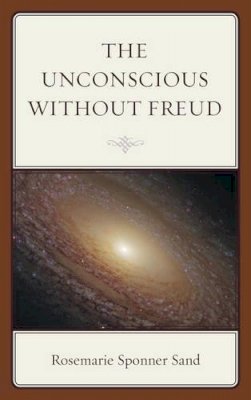
Stock image for illustration purposes only - book cover, edition or condition may vary.
The Unconscious without Freud
Rosemarie Sponner Sand
€ 142.88
FREE Delivery in Ireland
Description for The Unconscious without Freud
Hardback. Series: Dialog-on-Freud. Num Pages: 188 pages. BIC Classification: JMAF; MMJT. Category: (P) Professional & Vocational. Dimension: 242 x 159 x 19. Weight in Grams: 413.
During the first ten years of his career in psychological medicine, Sigmund Freud espoused a theory of unconsciousness which predated his own. As Rosemarie Sand describes in The Unconscious without Freud, he would evolve this theory over the course of his career and eventually apply it to his own psychological practice. Once Freud's hypothesis of unconscious mental functioning was published, the same professionals who had valued the traditional concept turned against what they considered to be a catastrophic, logically indefensible revision. The scientific investigation of unconscious influences was retarded for decades as a war zone opened between implacable opponents and intransigent defenders of the Freudian concept of unconscious mind. In the din of this battle, the traditional theory, free of the features which Freud's foes could not accept, was forgotten. Sand argues that a return to this original theory, which psychotherapists and experimenters might both espouse, could contribute to a cessation of hostilities and lead to the peaceful development of a theory of the unconscious—one that is free from the stigma that is currently attached to Freudian theory.
Product Details
Publisher
Rowman & Littlefield
Format
Hardback
Publication date
2013
Series
Dialog-on-Freud
Condition
New
Weight
413g
Number of Pages
188
Place of Publication
Lanham, MD, United States
ISBN
9781442231733
SKU
V9781442231733
Shipping Time
Usually ships in 15 to 20 working days
Ref
99-15
About Rosemarie Sponner Sand
Rosemarie Sand has been a psychoanalyst for twenty-five years. She is a member of the Institute for Psychoanalytic Training and Research and the International Psychoanalytical Association. Her works include Early Nineteenth Century Anticipation of Freudian Theory, Confirmation in the Dora Case, Pre-Freudian Discovery of Dream Meaning: the Achievements of Charcot, Janet, and Krafft-Ebing, On a Contribution to a Future Scientific Study of Dream Interpretation, and Freud and the Western Dream Tradition. She specializes in antecedents to Freudian theory.
Reviews for The Unconscious without Freud
Rosemarie Sand has resurrected the splendid theory of unconscious mental functioning proposed by G.W. Leibniz at the beginning of the eighteenth century, together with the contributions of Christian Wolff and other disciples during the following decades. The teaching of this Leibniz-Wolffian psychology was highly regarded and widely accepted during the nineteenth century. Freud himself relied on its conceptualization of unconscious mind during the decade before he created his own first theory. Its immediate, potential importance today is attributable to its being unencumbered by the controversial ‘Freudian’ features to which critics have objected, the grounds for the interminable ‘Freud wars.’ Devoid of these obstacles, the Leibnizian vision could easily serve as the common denominator for diverse Freudian schools; it could also render service as a common ground where psychoanalytic theoreticians and the experimenters of cognitive psychology could meet.
Adolf Grünbaum PhD, Andrew Mellon Professor of Philosophy, University of Pittsburgh This is a brilliant book. Sigmund Freud’s seminal discussions of the unconscious mind are well known to the general educated public. Less well known are the contributions to the subject made by Freud’s predecessors. What Rosemarie Sand has done is to show in detail using previously untranslated German sources that in the eighteenth and nineteenth centuries, there were far more than hints, brief comments, and allusions to unconscious mentality. Beginning with Leibniz’s impressive contributions to psychology, there were well worked out theories and entire schools of thought devoted to the study of the unconscious culminating in the major works of the nineteenth century scholars Heinz Hartmann and Jonathan Herbart. In present day discussions of consciousness, most of the contributions of these pre-Freudian theorists of the unconscious tend to be ignored except by a few specialists. Psychologists, philosophers, and indeed anyone interested in the human mind can profit greatly from reading Sand’s The Unconscious without Freud.
Edward Erwin, PhD, University of Miami
Adolf Grünbaum PhD, Andrew Mellon Professor of Philosophy, University of Pittsburgh This is a brilliant book. Sigmund Freud’s seminal discussions of the unconscious mind are well known to the general educated public. Less well known are the contributions to the subject made by Freud’s predecessors. What Rosemarie Sand has done is to show in detail using previously untranslated German sources that in the eighteenth and nineteenth centuries, there were far more than hints, brief comments, and allusions to unconscious mentality. Beginning with Leibniz’s impressive contributions to psychology, there were well worked out theories and entire schools of thought devoted to the study of the unconscious culminating in the major works of the nineteenth century scholars Heinz Hartmann and Jonathan Herbart. In present day discussions of consciousness, most of the contributions of these pre-Freudian theorists of the unconscious tend to be ignored except by a few specialists. Psychologists, philosophers, and indeed anyone interested in the human mind can profit greatly from reading Sand’s The Unconscious without Freud.
Edward Erwin, PhD, University of Miami
